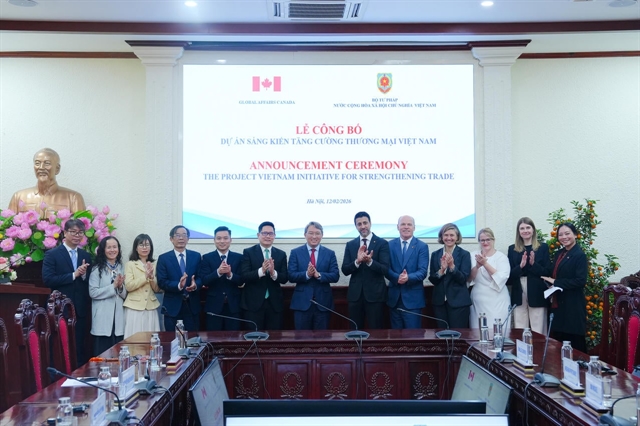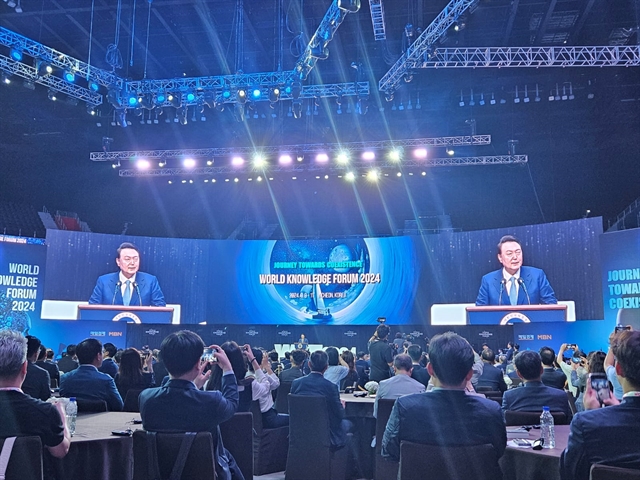 Society
Society

 |
| President Yoon Suk Yeol delivers a speech at the opening ceremony of the 25th World Knowledge Forum in Incheon, South Korea on Tuesday. Photo courtesy of Maekyung Media Group |
Thu Vân
INCHEON — President Yoon Suk Yeol of the Republic of Korea yesterday called for unity to overcome the threats and conflicts arising from rapidly evolving technologies and to enhance freedom and well-being for humanity through coexistence at the 25th World Knowledge Forum.
The forum, which runs from September 9-11, celebrates its 25th anniversary this year under the theme “Journey towards Coexistence”.
“We are currently living in an era of complex crises where geopolitical conflicts and competition are unfolding simultaneously. Authoritarian and totalitarian forces are continuously challenging the rules-based international order, and wars and conflicts persist across the globe,” President Yoon said.
He continued by addressing the dual nature of modern technologies.
“Innovative digital technologies, including AI, offer many benefits to our daily lives and industries, but they also pose side effects that harm human rights and democracy through fake news and deepfakes. It is now time to think about solidarity for coexistence,” he emphasised.
The President called for a collective approach to freedom and solidarity to address both technological and geopolitical threats: “The free world must stand firmly united to alleviate the suffering of vulnerable groups struggling under the fierce competition for technological supremacy and supply chains, and to protect freedom and democracy from fake news and false propaganda.”
President Yoon also traced the development of the World Knowledge Forum since its inception in 2000, underlining its role in fostering global dialogue on critical contemporary issues.
"This year, under the theme 'Journey towards Coexistence,' global leaders and scholars will come together to discuss and explore solutions to the challenges and crises humanity faces," he stated. He argued that the forum provides an essential space for proposing "wise alternatives" to today's multifaceted global issues.
Towards a future of coexistence
Following President Yoon’s keynote address, Dr Chang Dae-Whan, the founder of the World Knowledge Forum, took the stage to reflect on the forum’s 25-year history.
In a twist of innovation, Dr Chang used artificial intelligence to recreate a version of himself from 24 years ago, when the forum was first established.
"For the record, this is not a deepfake, it's me. No problem!" Dr Chang quipped, introducing "AI Chang Dae-Whan" to the audience.
The “AI Chang” provided a historical overview of the forum’s beginnings, recalling its foundation in 1997 amidst the Asian financial crisis.
"The World Knowledge Forum was conceived in 1997, during a period of significant turmoil in Korea," AI Chang noted.
The founding vision of the forum, he explained, was to make South Korea a "knowledge powerhouse" and create a platform for global knowledge exchange. "The theme of the first forum in 2000 was 'Shaping the New Millennium with Knowledge.'"
Reflecting on today’s world, AI Chang acknowledged that the challenges are even more turbulent than those of the past.
"The global landscape is dominated by the US-China hegemonic rivalry, Brexit, the Russia-Ukraine conflict, and the Israel-Hamas war," he said, noting that these conflicts have escalated beyond those of the Cold War era.
He stressed the importance of coexistence, the theme of this year’s forum, as a crucial principle for navigating these crises.
Dr Chang’s live remarks shifted focus to the future of human-AI relations. He posited that humanity must strive to become "Homo Technicus", a species that coexists with advanced technology, particularly AI. Drawing on Richard Dawkins' concept of the "extended phenotype," Dr Chang explained that technological advancements have always been about transcending human limitations, be it through tools like glasses, telescopes, or AI.
"As the first generation to face a future transformed by AI, we must create a new order: Homo Technicus, humans coexisting with technology," he said.
Beyond coexistence with technology, Dr Chang proposed a more profound transformation: "Homo Symbious", a society where humans coexist not only with technology but with each other.
"This is the key to the survival of ecosystems over millions of years," he said, emphasising that peaceful coexistence is essential to overcoming the conflicts and divisions that threaten global stability.
ASEAN's role in promoting coexistence and prosperity
Also speaking at the opening ceremony, President of the Cambodian Senate Hun Sen offered his perspective on ASEAN's efforts towards prosperity and development, particularly at a time when trends towards sustainable development and multilateralism are becoming increasingly prominent.
President Hun Sen elaborated on the methods ASEAN has used to maintain and promote peaceful coexistence. “The peaceful coexistence among ASEAN's internal and external partners is possible because ASEAN consistently adheres to its core principles, many of which are also reflected in the UN Charter. The principles of unanimity and non-interference are the keys to ASEAN's internal cohesion,” he said.
He added, “The principle of non-interference allows member states to set their own paths for national development. ASEAN’s neutrality, peaceful resolution, dialogue, and cooperation are focused on building friendship and partnerships among all parties,” highlighting ASEAN’s strategy of avoiding alignment with major powers while maintaining its neutrality in global conflicts.
Founded in October 2000 in response to the 1997 Asian financial crisis, the World Knowledge Forum aims to transform South Korea into a knowledge-driven nation. It brings together participants from across the globe, including government officials, politicians, academics, and private sector leaders, to share knowledge and promote balanced economic growth and global prosperity.
The forum, now in its 25th year, continues to serve as a vital platform for addressing global challenges and fostering dialogue on coexistence, innovation, and development. VNS




